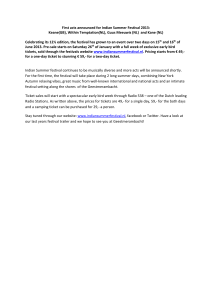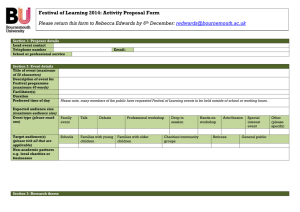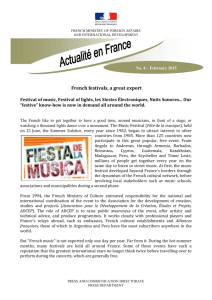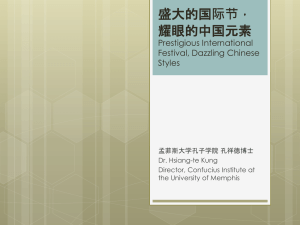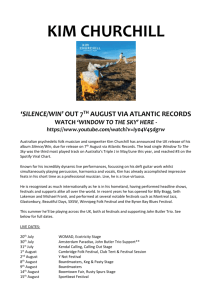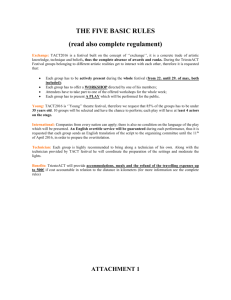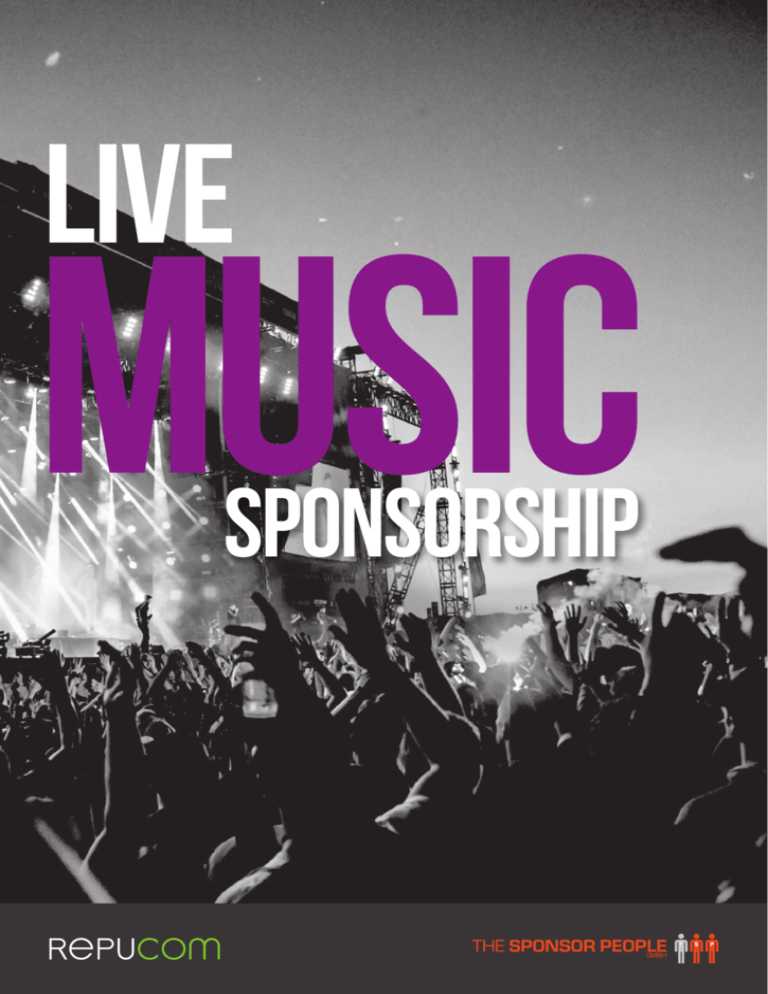
LIVE
MUSIC
SPONSORSHIP
Insights by Repucom
3
MUSIC IS ALL AROUND US
We listen to it, stream it, buy it, download it, share it, play it, consume it live
and react to it in all sorts of different ways. It stirs emotions and straddles territories; young or old, and across a multitude of genres, music provides a passion point for millions of people all over the world – and presents a valuable
opportunity for brands and promoters to align themselves with significant
groups of concert attendees or festival-goers. In terms of interest, across the
major markets of France, Germany, UK, USA and Japan, interest in music
surpasses sport, watching television and film/cinema, underlining the power
LIVE MUSIC 2016
Music offers a multitude of opportunities for brands to engage with fans
but selecting the right property, ensuring the right fit, and the right activation
strategy is not a quick decision. It is a complex marketplace, full of moving
parts. Opportunities for sponsors can range from a major global three-day
festival, at the top level, down to a small gig in a local pub, club or arena. And
that’s before you consider the many genres of music, each with its own values,
culture and fan groups.
Repucom’s first global live music sponsorship report has been designed
to examine the current landscape, from festivals to venues, tours to artist
endorsements; this report concentrates on the young (14 – 34 year olds)
music audience in the five major global music markets: the USA, UK, France,
Germany and Japan.
and potential of live music sponsorship. Furthermore, half
of the 86 per cent interested in music profess to be ‘very
interested’, highlighting music’s emotional pull. By way of
comparison, only 41 per cent of people are ‘very interested’ in watching TV, 32 per cent ‘very interested’ in
sport, and 45 per cent ‘very interested’ in films and cinema. In such a vibrant marketplace, the opportunity for
brands is clear.
Interest in music versus other leisure activities
Music transcends all demographics far more than any other leisure activity,
which is reflected in the high interest levels – regardless of nationality,
there are very few people in the world who do not like music of some kind.
Paul Smith
Founder and CEO,
Repucom
FilM /Cinem
Like all entertainment, the music industry is being impacted by new technologies – in fact music bore the brunt in terms of its traditional commercial
model well over a decade ago but has adapted and streaming services in
particular are creating new opportunities, while new media platforms and
distribution methods are providing additional scope for brands to align
themselves and interact with the world’s top artists. Promoters and sponsors
of live music events, meanwhile, are able to amplify their message well beyond those fans who are on-site at a festival or major show. Technology is
drawing promoters, brands, artists and fans closer together than ever before.
CONTENTS
Sport
a
83%
59%
V
Watching T
GLOBAL
TOP 5 MUSIC
MARKETS
music
79%
86%
FRANCE | GERMANY | UK | USA | JAPAN
04 I AUDIENCE
Understanding the music fan, across
different genres, is vital for potential sponsors.
12 I SPONSORSHIP
Opportunities in music sponsorship range
from venues to artists to tours and festivals.
08 I MEDIA
How music fans consume – and share –
content from festivals and concerts.
18 I A
RTISTS
Beyond sales, the marketability and awareness
of major artists are key metrics for brands.
FRANCE
GERMANY
UK
USA
MUSIC88%
MUSIC MUSIC84%
MUSIC SPORT60%
SPORT64%
SPORT53%
SPORT62%
SPORT57%
WATCHING TV 77%
WATCHING TV 74%
WATCHING TV 87%
WATCHING TV 83%
WATCHING TV 76%
FILM/CINEMA FILM/CINEMA83%
FILM/CINEMA FILM/CINEMA82%
FILM/CINEMA73%
89%
85%
86%
JAPAN
89%
MUSIC
81%
Base: 14 – 34 year olds. Source: Repucom Market Research
©2015 Repucom
Insights by Repucom
5
Audience
AUDIENCE
Whether attending a concert, travelling to a music festival or
simply watching an artist perform at a club or pub, understanding
the music audience is a fundamental for potential sponsors.
WHAT TYPES OF MUSIC ARE PEOPLE LISTENING TO AND INTERESTED IN?
While pop and rock music dominate the top five markets – and only in the
USA do more people like rock than pop – further down the list market specific
preferences become clearer. Rap and hip-hop, for example, is more popular in
the United States than other markets, while 29 per cent of people in Japan, far
more than any other market, like classical music. Electro and dance is most
popular in France. Over two-thirds of people in the UK and USA enjoy alternative or indie music, although the definition of the genre is likely to mean different
things to different people – artists and bands might initially
describe themselves, or be described, as ‘alternative’ before gaining popularity and becoming more mainstream
rock acts. Heavy rock and heavy metal, meanwhile, are
the most polarising of the main music styles: 26 per cent
globally ‘don’t like it at all’ compared to 4 per cent for pop
and 7 per cent for rock.
Interest in different types of music
TOP 5 MUSIC
MARKETS
TYPES OF MUSIC
FOLK
REGGAE
17%
Pop
20%
POP
Rock
55%
CLASSICAL
Rap/Hip-hop
24%
RnB/Soul
ROCK
HARD ROCK
HEAVY METAL
Electro/Dance/Techno
49%
25%
Alternative/Indie
INDIE
ALTERNATIVE
29%
Hard rock/Heavy metal
ELECTRO
DANCE
TECHNO
RNB
SOUL
32%
FRANCE
RAP
HIP-HOP
Classical
33%
Reggae
Folk
32%
GERMANY
UK
USA
JAPAN
1
53%
1
61%
1
55%
1
58%
1
51%
2
48%
2
55%
2
47%
2
55%
2
39%
3
40%
3
37%
3
41%
3
42%
3
29%
4
38%
4
36%
4
37%
4
40%
4
19%
5
35%
5
33%
5
36%
5
34%
4
19%
5
34%
4
19%
Base: 14 – 34 year olds
Insights by Repucom
6
7
Audience
Audience
EVENT ATTENDANCE
SPENDING AT MUSIC EVENTS
are more likely to attend multiple concerts in a pub or club,
in all likelihood because there are many more events of this
type and ticket prices tend to be far cheaper. The proportion attending more than ten, though, remains small.
More people across France, Germany, the UK, USA and Japan have attended a music festival than a major arena gig or pub or club show over the past
12 months. But as expected, given the costs of attending a festival or big stadium show, the majority of people attend only one major event per year. People
While the average ticket price per festival according to the five major markets is €75.5, significant differences emerge across the individual markets. Of
the big five, France has the lowest average festival ticket price at €43, while the
UK average is just over €112. British festival fans also spend the most on food
Spending of live music events visitors (%)
Number of festivals attended
VISITED A LIVE MUSIC EVENT IN THE LAST 12 MONTHS?
17
In total, music fans aged 14 to 34 pay
€17.2 billion every year to experience
live music events in the top 5 markets.
52%
46%
41%
36%
Ticket prices/Consumer spend (€ )
59
26
CONCERTS
IN AN INDOOR
ARENA
8
56
28
10
12 1
4
CONCERTS
IN A PUB OR
CLUB
33
25
CONCERTS
IN A STADIUM
OR SIMILAR
(OPEN AIR)
31
18
45.1
62
AVERAGE TICKET PRICE
(€) PER FESTIVAL
76.4 70.5
28
52.6
Base: 14 – 34 year olds
60
43.2
VenuesCASE
with a strong
focus on music events and without a sports team as anchor tenant are in bold.
FESTIVAL
STUDY
Source: Repucom Market Intelligence
JAPAN
USA
UK
GERMANY
the region at festival-time, while accommodation outside the festival campsites generated over €500,000. In
the venue over €5.5 million is generated from food and
drink, while over €1.5 million is spent on merchandise.
Admission fees make up over €11 million each summer.
FRANCE
1
41.5
27.6
AVERAGE FOOD
AND DRINK (€) SPEND
AT FESTIVALS
WACKEN OPEN AIR: THE WIDER ECONOMIC PICTURE
Wacken Open Air is an annual heavy metal festival held in northern Germany. The attendance each year is around 85,000, just under 20 per cent of
which are international visitors, and the festival delivers an economic impact
to the Schleswig-Holstein region of around €25 million. On average, visitors
stay for over four nights. Around €1.31 million is spent on food and drink in
58.2
29
GERMANY
26
FESTIVALS
15
2
66.6
43
8
GERMANY
2
76.8
75.7
FRANCE
NUMBER OF MUSIC EVENTS
ATTENDED IN THE LAST YEAR BY %
et
tick ival
e
g
a
Aver per fest €75.5
e
s
p r ic m a r k e t
5
p
To
Across the five biggest music markets,
the average ticket price for a music
event is just under €54, while the average
spend for food and drink is €24.6 and
the average travel and accommodation
spend is just over €49.
JAPAN
1 music event
2 music events
3–5 music events
6–10 music events
More than 10 music events
112.1
USA
TOP 5 MARKETS
UK
open-air
FRANCE
Concert in a stadium
or similar
Festival (indoor/open air)
Concert in a pub/club
Concert in an indoor arena
C oncert in a stadium or similar (open air)
25
Based on 14 – 34 year old event visitors and including tickets, food and drink, travelling and accommodation.
JAPAN
Concert in a pub or club
36
(BY %)
USA
Concert in an indoor arena
SPENDING
IN TOP 5
MARKETS
22
UK
Festival indoor/open air
13
and drink and travel and accommodation. Attendees of
events such as Glastonbury and V Festival spend an average of just over €58 on food and drink whilst at a festival,
and over €76 to travel to and from a venue and stay there.
AVERAGE TRAVEL
AND ACCOMMODATION (€)
SPEND AT FESTIVALS
Base: 14 – 34 year olds
©2015 Repucom
Insights by Repucom
9
Media
WHERE ARE FANS FINDING INFORMATION ABOUT MUSIC EVENTS?
The distribution power of the internet is clear when examining how music
fans receive and digest information about live music events. General music
websites and official event websites, where tickets can be purchased and lineups are generally announced, are both popular sources, while over 40 per
cent of fans across the five major markets also look to Facebook and friends
and family for information: it is an indication that fans tend to inform them-
selves about an event, through websites or traditional
media such as television, before sharing that information
with friends, family and social communities. By market,
television’s continuing significance is underlined while radio remains particularly relevant as an information source
in the United States and France.
How do people get information about live music events? (%)
TOP 5 MARKETS
43
43
Facebook
Friends/family
TV
General websites
Official event website
Radio
YouTube
22
15
Specialist music magazines
13
13
Instagram
Apps (smartphone/tablet)
12
11
Daily newspapers
Email newsletter
Jap
an
US
A
an
ce
y
MARKET BY MARKET
Twitter
UK
24
an
32
rm
37
36
ge
39
Fr
MEDIA
New media and social platforms
are allowing music fans to consume
and share more content from concerts
and festivals, opening up opportunities
for promoters and sponsors.
4133354246
Radio
4136284411
Daily newspapers
1015121111
Specialist music magazines
1414141617
Friends/family
45
52485811
Official event website
3147333634
General websites
4735342938
Facebook
4849515612
Twitter
14
9
28
34
28
Instagram 9
7
17
30
3
YouTube
3634354223
Apps (smartphone/tablet)
13
10
15
19
6
Email newsletter 7
11
12
15
8
TV
W
NE
SL E
R
T TE
Base: 14 – 34 year olds
Insights by Repucom
10
11
Media
Media
THE IMPORTANCE – AND LONGEVITY – OF VOD
EXPOSURE, TOUCHPOINTS AND ACTIVATION
Unlike sport, which has traditionally benefited from major live coverage –
and the attendant rights fees – major music events, especially festivals, are far
more reliant on other forms of media distribution, such as VOD and social sharing to secure major audiences. Indeed VOD platforms are vital for festivals, as
places where live performances can live on many weeks after an event, whereas
sport tends to be more influenced by results and news and is therefore always
producing new images. Across the top five markets, over 40 per cent of music
fans say they sometimes watch music video clips on video sharing websites like
YouTube, the same proportion as watch live broadcasts or recordings on TV. 39
per cent regularly watch live broadcasts or recordings via online streaming.
Opportunities for brand integration into a major festival can begin almost
as soon as the previous year’s edition has concluded, starting with the
opening ticket sales promotions and announcements of the line-up – these
tend to be the first media touchpoints, resulting in coverage, discussion and
sharing amongst fans. Various communications channels can be utilised in
advance of the event. Often, sponsors rely on web-focused activation concepts which enable brand positioning and audience communication long
before the actual event, followed later by on-site activities. Philipp Schmoll of
Jägermeister confirms this, and adds: “Digital channels are by no means
detached from the overall communication, but are strongly coupled with the
TV versus Live stream versus video on demand clips
A festival’s media footprint
TOP 5 MARKETS
THE THREE WAVES OF EXPOSURE
VS.
REGULARLY WATCHING
LIVE BROADCASTS OR
RECORDINGS ON TV
18%
42% SOMETIMES
VS.
REGULARLY WATCHING
LIVE BROADCASTS OR
RECORDINGS USING
INTERNET STREAMING
15%
SUCH AS YOUTUBE
35%
Base: 14 – 34 year olds
TODD PALMERTON – NATIONAL DIRECTOR OF LIVE MUSIC, RED BULL NORTH AMERICA
©2015 Repucom
ebo
Fac ube
T
You gram
a
Inst er
tt
Twi
15 16
The touchpoints
CASE STUDY
“I don’t believe that marketers are thinking long-term and I have not seen any event
concepts that I think are moving the needle
outside of what we are doing at Red Bull.
Staying creative, relevant and credible are
the biggest challenges – people are on their
DIA
E
M
IAL DEO
C
O
S VI ND
AND DEMA
ON- ok
42% SOMETIMES
39% SOMETIMES
“There are 80 million consumers between the ages of 18 and 35 in the US that
deeply connect with music on a daily basis,
making it the most relevant category to target. Brands are focusing more on millennials and Hispanics in this age range. Excluding country music, hip hop and electronic
indie pop are the two most relevant genres
at the moment.
live
TV
nd
s
Bra t Sale
c
Dire ation
iv
Act
SHARING WEBSITES
With an average of eight hours per day of shows at a
multi-day festival, sponsors have sufficient time to create
exceptional brand experiences for fans. The on-site
activities remain vital. As Lars-Oliver Vogt, CEO from
The Sponsor People says: “High quality and direct contact with the event viewer remains the crown jewel onsite and has a special significance for music sponsors”.
S
IL VE ADCAST
BRO streams
SITE
N
O ing
WATCHING VIDEO CLIPS ON
analogue world”. A joined-up activation strategy will pay
dividends.
smartphones more than ever taking pictures, filming shows and sharing.
“As record sales continue to decline, labels lose more and more money which
drives up the performance fees for brands.
This in turn increases the cost of touring
and festival sponsorship fees year over year.
“People go to festivals and concerts to
see music and let loose with their friends.
They do not go to shows to be sold a car.
It’s about creating content that can reach
consumers beyond the four walls of the
venue and providing shareable social media
moments on-site.”
FIRST LINE-UP
ANNOUNCEMENTS
SOLD-OUT
ANNOUNCEMENT
PRE-FESTIVAL
ACTIVATION
EARLY-BIRD
TICKET SALES
SHOW
TIME:
FESTIVAL
WEEKEND
POST-PRODUCTION
SEEDING
Insights by Repucom
12
13
Sponsorship
Sponsorship
SPONSORSHIP
At festivals, concerts, venues or during
tours sponsors are finding effective ways
to activate, either on-site or by reaching
a wider audience via media channels.
VENUE SPONSORSHIP
Major venues worldwide can attract anything between 500,000 and two
million attendees per year, while the number of music events per year can range
from 50 to 150. The flexibility built into major indoor and outdoor venues ensures they can switch from hosting a variety of sports events to a concert in a
very short space of time. As well as the major indoor venues, several major
open-air sports stadiums also host concerts on a semi-regular basis – prime
examples are Wembley Stadium and the Emirates Stadium in London, MetLife
The world’s major music venues
MARKET BY MARKET
Philips Arena
Atlanta
Atlanta Hawks
Radio City Music Hall
New York
no Team
Staples Center
Los Angeles
LA Lakers, LA Clippers, LA Kings
Barclays Center
Brooklyn
Brooklyn Nets, New York Islanders
Madison Square Garden Arena
New York
New York Knicks, New York Rangers
Red Rocks Amphitheatre
Morrison
no Team
The O2 – London
London
no Team
Manchester Arena
Manchester
no Team
The SSE Hydro
Glasgow
no Team
Genting Arena
Birmingham
no Team
Ziggo Dome
Amsterdam
no Team
Amsterdam Arena
Amsterdam
AFC Ajax
Auditorio Nacional
Mexico City
no Team
Foro Sol
Mexico City
no Team
Barclaycard Arena
Hamburg
HSV Hamburg, Hamburg Freezers
Lanxess Arena
Cologne
Kölner Haie
Mercedes-Benz Arena
Berlin
Alba Berlin, Eisbären Berlin
FRANCE
AccorHotels Arena
Paris
no Team
Stade de France
Paris
no Team
CANADA
Air Canada Centre
Toronto
Toronto Raptors, Toronto Maple Leafs
Rod Laver Arena
Melbourne
no Team
Allphones Arena
Sydney
no Team
USA
UK
NETHERLANDS
MEXICO
GERMANY
AUSTRALIA
Source: Repucom Market Intelligence
©2015 Repucom
Stadium in New Jersey and the recently-opened Levi’s
Stadium in San Francisco. Major cities like London also
boast parks which host major concerts, thanks to tie-ups
with major promoters – AEG, for instance, has the contract for music events in London’s Hyde Park, while the
Queen Elizabeth II Park, created for the London Olympics,
features concerts promoted by Live Nation.
Major venues
worldwide can attract
anything between 500,000
and two million attendees
per year, while the number of
music events per year can
range from 50 to 150.
Venues with a strong focus on music events and without a sports team as anchor tenant are shown in purple.
Insights by Repucom
14
15
Sponsorship
Sponsorship
THE GLOBAL FESTIVAL LINE-UP
Biggest festivals by attendance (est. visitors per day in 2015)
Glastonbury
UK
175,000
Electric Daisy
Carnival
USA
130,000
Lollapalooza
USA
100,000
Coachella Valley
Music and Arts
Annual Festival
usa
Rock am Ring
germany
90,000
Rock in Rio
Brazil
85,000
V Festival
Reading Festival
(Hylands Park)
90,000
UK
Roskilde
UK
87,000
Wacken Open Air
Denmark
Germany
85,000
85,000
99,000
Rock Werchter
Belgium
85,000
Corona Capital
Festival
Mexico
85,000
Every music festival has its own character which develops over time,
shaped by the genre, those who attend, the venue itself and the artists who
perform. Some have international recognition, while many have a distinctly
domestic audience. The level of media coverage can also differ significantly.
In some cases festivals are twinned on the same weekend and share a bill,
Awareness of music festivals (%)
TOP 5 BY MARKETS
FRANCE —
Rock en Seine is a three-day
rock festival which has taken place each year
in Paris since 2003 – Kasabian, The Libertines
and The Chemical Brothers headlined in 2015.
Vieilles Charrues, in Brittany, is France’s largest festival.
GERMANY —
Rock am Ring and Rock im
Park take place simultaneously and share lineups over the same weekend. Hip hop and
Reggae festival Splash! is not amongst Germany’s largest festivals, but benefits from a
strong media footprint.
UK — Glastonbury receives significant me-
T in the Park
UK
85,000
Austin City Limits
Music Festival
USA
75,000
Stagecoach
Festival
USA
75,000
Hurricane
Festival
Germany
72,000
dia coverage across BBC platforms in the UK
each year, while August’s V Festival has been
a fixture since 1996. Also in August, the Reading Festival is twinned with Leeds Festival,
sharing a bill.
USA —
Source: Repucom Market Intelligence
Three of the biggest free music festivals
DONAUINSELFEST
Austria
1.1 m
approx.
visitors per day
3.3 million in total over three days
©2015 Repucom
MAWAZINE FESTIVAAL
Morocco
300,000
approx.
visitors per day and
2.65 million in total over nine days
(free access to 90 per cent of the shows).
PRZYSTANEK WOODSTOCK
Poland
approx.
250,000
visitors per day
750,000 in total over three days.
largely for promotional and organisational reasons –
Reading and Leeds in the UK are prime examples. A
shared commercial structure at these events offers
brands double the opportunity for on-site activation and
higher media exposure.
Lollapalooza is currently staged
in Chicago, while Coachella is the highest
grossing music festival in the world. The Vans
Warped Tour is a travelling punk and alternative festival, while South by Southwest (SXSW)
has grown from a music conference into a
major film, music and technology showcase.
JAPAN — The Fuji Rock Festival is Japan’s
largest festival and has taken place at Naeba
Ski Resort in Niigata since 1999. Summer
Sonic is staged simultaneously in Osaka and
Chiba. Countdown Japan is a four-day festival
staged in the run-up to New Year’s Eve.
1
2
3
4
5
Rock en Seine
1
2
3
4
5
Rock am Ring
1
2
3
4
5
Glastonbury
1
2
3
4
5
Lollapalooza
1
2
3
4
5
Fuji Rock Festival
78
72
Vieilles Charrues Festival
57
Eurockéennes de Belfort
Hellfest Summer Open Air
42
39
La Route Du Rock
91
83
Wacken Open Air
75
Rock im Park
59
Hurricane Festival
43
Splash! Festival
85
76
73
72
V Festival
T in the Park
Reading Festival
68
Isle of Wight Festival
73
61
Coachella Valley Music and Arts Festival
56
56
Summerfest
Vans Warped Tour
44
South by Southwest
65
63
Summer Sonic
48
47
Countdown Japan
Rock in Japan
Rising Sun Rock Festival
29
Base: 14 – 34 year olds
Insights by Repucom
16
17
Sponsorship
Sponsorship
THE MOST RECOGNISABLE MUSIC BRANDS AND HOW FANS REACT TO LIVE MUSIC SPONSORSHIP
larly in live music event sponsorship, more recently the
sector has been the domain of energy drink brand like
Red Bull and Monster. Live music fans recognise and remember brands who advertise with artists and have major exposure at concerts or festivals.
Coca-Cola is the most recognised music sponsor in the world. Over the
years its portfolio has included venues, festivals, tours, artists, broadcast
sponsorship of music entertainment shows like American Idol and a tie-up
with Apple’s iTunes service. Like rival Pepsi, it is a longstanding investor in
music. While the 1990s saw mobile phone operators invest heavily, particu-
CASE STUDY
The size of the temporary facility means it has the
potential to cater for the 90,000 festival attendees,
with employees working in three shifts and products
re-stocked throughout a festival weekend. In short,
the RockShop means festival-goers no longer need
to carry food and drink with them as they travel to a
festival site.
A joint collaboration between Lidl and The Sponsor People, the activation seems to have struck a
chord. The announcement of the Lidl RockShop at
Rock Am Ring resulted in over 3,000 Facebook ‘likes’,
while post-event research showed that that nearly 60
per cent of attendees shopped in the facility. 96 per
cent of attendees, meanwhile, said they loved the
concept, with nearly 86 per cent stating they would
be doing their whole shop at the Lidl Rock Shop at
the following year’s event.
TOP 5 MARKETS
COMBINED
Where do music fans notice sponsors? (%)
1
LIDL’S ROCKSHOP
At this year’s Rock Am Ring festival, held at the
former air force base in Mendig after many years at
the Nurburgring, supermarket chain Lidl was present
and activating through its Lidl RockShop. The RockShop is a pop-up supermarket, covering around
2,000m², and selling over 160 food, drink and hygiene
products to festival-goers.
Awareness of sponsors
Following a festival/
concert on-site
9
11
31
Seeing a related advert
of a brand/company
Following a festival/
concert in the media
20
Following an artist/
band in the media
I can’t remember
29
Base: 14 – 34 year olds
1
Coca-Cola
2
Red Bull
3
Pepsi
What are music fans interested in? (%)
SMARTPHONES
TRAVELLING
FILM/MOVIE STREAMING SERVICES
54%
53%
4 O2
5 Heineken
50%
COMPUTER GAMES/CONSOLES
48%
CONSUMER ELECTRONICS (TV, CAMERAS, HI-FI)
47%
MUSIC STREAMING SERVICES
42%
FASHION
41%
SOFT DRINKS
36%
COSMETICS
33%
FAST FOOD
32%
CARS
31%
BEER
24%
SPIRITS
20%
INSURANCE/FINANCIAL SERVICES
15%
TOBACCO
14%
France
1
Coca-Cola
2
Red Bull
Germany
UK
1
1
Red Bull
2
Coca-Cola
O2
2
Coca-Cola
USA
1
Pepsi
2
Coca-Cola
3
3
3
3
Crédit Mutuel
Beck’s
Virgin
Budweiser
4
4
4
4
Orange
Telekom
Red Bull
Red Bull
5
5
5
5
Virgin
Rockstar
Vodafone
Monster
Japan
1
Coca-Cola
2
Red Bull
3
Sony
4
Nike
Base: 14 – 34 year olds
CASE STUDY
BECK’S: HENNER HÖPER, MARKETING DIRECTOR, ANHEUSER-BUSCH INBEV GERMANY
“The
key element of all our communications is for consumers to get a
Venues with a strong focus on music events and without a sports team as anchor tenant are in bold.
Source: Repucomof
Market
Intelligence
live experience
our
brand. A festival is the best possible place to experience this. Sponsorship is an integral component of our communications
strategy and we are proud that we have partnerships in many different
genres. In terms of awareness, Beck’s is one of the leading companies in
the field of music sponsorship.
“Sponsorship isn’t only defined by the transfer of goods and financial
support in exchange for advertising space. We link our sponsorships to our
current communications every time. If we are to support an event we
should understand who the key target group is and accordingly shape our
imaging. We load up the brand with values like freedom and internationality – and it also stands for discovering new things. We also try to offer interaction. As a general rule concerts offer interaction, but we are also
searching for additional value – for example, by organising a special ‘meet
and greet’ with an artist.
“On a festival weekend we achieve some two million direct contacts, but it isn’t enough to hang up banner advertising on a stage. We organise activations like
the Beck’s Truck, a beer pre-order service and other
accompanying activations. That gives us presence and
additional value; a TV spot is unlikely to provide this
intensity (of exposure). To cut a long story short, you
can watch a TV spot a hundred times but it will not
have the same effect as a complete weekend with your
brand in a personal surrounding. Every brand has their
own strategy and positioning and out of this arise individual concepts and marketing approaches. Going forward it is our intention to work with powerful partners
and we want our consumers to have contact with our
brand. Sponsorship is not an asset in itself, but rather
an integrated part of overall communications.”
Base: 14 – 34 year olds
©2015 Repucom
Insights by Repucom
19
Artists
ARTISTS
As the business model underpinning the music
industry evolves, the world’s major artists are
exploring new ways to connect with fans and
generate revenues.
PLAYING TO THE CROWDS
Successful music acts come and go – popularity is generally measured
in sales, number of downloads and tour revenues, but credibility can be
harder to gain and quantify – virtually by the month, but for a select few
breakout chart success can turn into a lucrative and lengthy career; indeed,
there are world-renowned performers – amongst them Sir Elton John, Stevie
Wonder, U2 and the Rolling Stones – who continue to sell out shows around
the world many years after their last number one chart hit. For the major
global acts of 2015, tour sponsorships and brand endorsements are not uncommon – artist reluctance to partner with corporate brands seems to be
waning, with the changing dynamics of the music industry prompting a search for new revenue streams and
ways to connect with a fan base. Partnerships with the
right brands can be a valuable way to achieve both. Several of the world’s major artists are now effectively the
CEOs of their own corporations, with their own product
ranges. As Adele, who eschews brand endorsements,
proved in late 2015, though, there is more than one way
for an artist to be successful.
The biggest grossing tours of 2015 by ticket sales and number of shows
57
KENNY CHESNEY
LUKE BRYAN
55
TAYLOR SWIFT
71
44
1.34 M
FLEETWOOD MAC
EST. TICKET SALES
591 K
1.01 M
EST. TICKET SALES
EST. TICKET SALES
1.98 M
EST. TICKET SALES
SHANIA TWAIN
68
MAROON 5
ONE DIRECTION
62
890 K
687 K
EST. TICKET SALES
EST. TICKET SALES
U2
BILLY JOEL
29
18
THE ROLLING STONES
710 K
625 K
EST. TICKET SALES
Source: Billboard/Boxscore (Nov 2014 – Nov 2015)
EST. TICKET SALES
64
1.13 M
EST. TICKET SALES
2.34 M
EST. TICKET SALES
80
20
21
Artists
Artists
THE MOST MARKETABLE ARTISTS
The world’s major international music acts are global brands in their own
right, using a variety of platforms and touchpoints to connect with fans and ultimately generate revenue – everything from tours to merchandise to major
brand collaborations. The age of Twitter, Facebook and Instagram has allowed
for the most astute artists to generate a closer, more personal, authentic and
interactive relationship with fans. Celebrity Davie Brown Index (DBI) is a tool
which can measure the public’s perceptions of over 8,000 personalities across
15 markets around the world, representing the views of
over 1.5 billion people. It can look at specific demographics – in this case, the most marketable solo artists of 2015
amongst Americans aged between 13 and 24 – to give a
clear identification of how audiences consider a personality, and how personalities compare to one another. Here,
then, are the most marketable artists of 2015.
LADY
GAGA
DBI 85.1
Celebrity DBI scores
JUSTIN
TIMBERLAKE
DBI 86.4
THE TOP TEN COUNTDOWN
10
81.6
BRUNO MARS
DBI
SNOOP
DOGG
DBI 82.9
BEYONCE
KNOWLES
DBI 84.6
KATY
PERRY
DBI 85.1
©2015 Repucom
6
5
4
9
81.8
NICKI MINAJ
DBI
8
81.8
BRITNEY SPEARS
DBI
7
82.1
NICK JONAS
DBI
Controversial but undoubtedly a major breakout star, Snoop Dogg has
released 13 studio albums and a further eight collaborations since his debut,
Doggystyle, in 1993, in addition to his work as an actor in film and television.
He has also developed a diverse business and commercial portfolio, appearing as an ambassador for a long list of brands as his gangster image has
softened. In an extension of the traditional brand ambassador role, Adidas
named the rapper Director of Football Development midway through 2015,
launching an accompanying range of Snoop-branded cleats.
One half of music’s premier power couple, Beyonce has become a major
global brand in her own right since Destiny’s Child disbanded in 2001. Multimillion dollar revenues from tours and albums have followed, as have a string
of major endorsement deals: her 2012 brand ambassador partnership with
Pepsi is worth a reputed $50 million. Her other partners over the past decade
have included American Express and L’Oreal. More recently she has embarked on a joint venture with Topshop and become a co-owner, alongside
husband Jay-Z, of music streaming service Tidal.
Katy Perry’s breakthrough hit, I Kissed A Girl, was released in 2008, propelling her to global stardom which has been burnished through a series of
record-breaking album releases and a documentary movie, Katy Perry: Part
of Me. Her mass-market appeal was underlined by the diverse sponsor roster for the North American leg (one of six global legs) of her AEG Live-promoted Prismatic World Tour in 2014: partner brands included Citi, as official
credit card, cosmetics firm Covergirl and presenting partner Staples, the office supplies retailer.
3
2
1
TAYLOR
SWIFT
DBI 88.5
Lady Gaga’s first album was released in 2008 and was an immediate global hit. Four more albums have followed, most recently 2014’s Cheek to Cheek,
as well as a series of tours and a lucrative 2014 residency in New York. Her
corporate partnerships have included a deal with Doritos, Virgin Mobile. Absolut and Hewlett-Packard, while Diet Coke cans appeared prominently as hair
rollers in the video to her song Telephone. Her fan base, dubbed the Little
Monsters, has its own offshoot official online community, where people are
encouraged to ‘gather, create, share and inspire’.
Timberlake’s career began two decades ago as a member of boyband
NSYNC but it is as a solo act, and actor, that he has found major stardom. He
also has a keen business brain, creating the William Rast fashion label in 2005
and forging partnerships with a variety of major corporate brands, notably a
two-year deal with Mastercard for the company’s Priceless campaign in 2013.
Signed to IMG, he also has interests in restaurants, golf clubs and a small
shareholding in the NBA’s Memphis Grizzlies many of which he publicises on
his personal Twitter feed to around 50 million followers.
Since 2009, Swift has had endorsement and collaboration deals in place
with the likes of Elizabeth Arden, Diet Coke, CoverGirl, Sony, L.e.i jeans and
Keds, but her popularity and appeal has taken another leap in more recent
times as she has moved from her country music roots to a fully-fledged pop
artist – according to Forbes, she made some $80 million between June 2014
and June 2015, as her album 1989 was released. She also demonstrated her
industry influence in 2015 by refusing Apple permission to stream the album,
prompting a change of policy by the company – it reversed a decision not to
pay artists for music streamed during a three-month trial period. She remains
signed to Tennessee-based Big Machine Records, which specialises in country music artists. As of mid-November 2015, her official Twitter handle was
followed by no fewer than 66.2 million people.
CASE STUDY
EVAN GREENE – CHIEF MARKETING OFFICER, THE RECORDING ACADEMY
“We are a not-for-profit trade organisation designed to improve the
cultural
condition
of onmusic
and
its makers.
serve
the
music industry
Venues
with a strong focus
music events
and without
a sports team We
as anchor
tenant are
in bold.
Source: Repucom Market Intelligence
in various ways and we have become globally famous based on the single television event we produce once a year, the GRAMMY Awards.
“The dynamics of the music industry as a whole is changing radically.
I think what you’re seeing is in a lot of ways the revenue model is different
today than it’s been before, and artists realise that in order to get paid
they’re generally a lot more amenable to marketing partnerships, whereas in the past it was a little bit taboo. You have brands that have become
a lot more innovative. I believe you have artists that have become a lot
more open to working with brands, and there’s so much money that’s
been put on the line by promoters that they need a way to recoup a lot of
that. Partnership marketing has become a really good revenue line item
and artists realise that they’ve got to do things in a little bit of a different
way – it’s not about just getting a cheque, it’s about who can help bring
incremental visibility and who can help provide greater exposure. Brands
have become an interesting way to do that. Music has a different type of
connection with people. I think brands that do it right really are able to
create a deeper connection with fans. That’s something that I think lasts.
“There’s always been a real intersection between music and technology. I believe that’s absolute, and I see that continuing. I see artists continually using technology in new ways to create music,
and technology allowing new ways for fans to consume music. I think technology empowers artists,
and will continue to bring fans and artists closer together. Brands can really take advantage of that.
There’s new ways to distribute music, there’s new
ways to engage and interact with fans. The smarter
brands have become more sophisticated and authentic in the way they try to reach fans and it’s not
just about couponing, discounting and trying to get
someone to buy. It is about creating relationships
and I think technology is allowing that in unprecedented ways.”
22
23
What next?
Artists
WHAT NEXT IN LIVE MUSIC SPONSORSHIP?
While technological advances have opened
up a raft of exciting possibilities, in terms of connections with fans and distribution of content,
on-site activation remains at the heart of many
sponsors’ commitment to music, and is often
driven by passion and innovation.
Before that, however, there are a multitude of
touchpoints in anticipation of the event, where
promoters and brands can help to stoke interest
and discussion. “As we talk with potential partners, we attach great importance to the understanding that advertising services should be activated long before the actual event,” notes Folkert
Koopmans, Managing Director of FKP Scorpio,
currently the promoter of 16 festivals. “We connect with our visitors for the whole year and at the
different peak times that can be accompanied by
communications from our partners.”
Especially at multi-day festivals, activations
including visitor amenities, such as clean showers, charging stations for smartphones and
parking, are looked upon particularly favourably.
“For newcomers especially, it is recommended
to make the subject of the activation the basic
needs of event visitors, to ensure that an on-site
activation doesn’t lack clarity or sense,” con-
“We connect with
our visitors for
the whole year. at
the different peak
times that can
be accompanied by
communications
from our partners.”
FOLKERT KOOPMANS, FKP SCORPIO
“It is the posts of stars
that will always be
regarded with envy
back home.”
LARS-OLIVER VOGT, THE SPONSOR PEOPLE
Delivering effective live music sponsorship campaigns
Bra
nd-F
O
r
i
i
Ent
erta ginalit t
y
inm
e
nt V
I
Uniq nterac
al u
t ivi
ue o
e
t
pp o
y
G
rou
p Ex
per
rtu
niti
ienc es
es
for Basic
self ne
-Exp ed
re s
sion
Bat
te
wifi ry
©2015 Repucom
firms Philipp Schmoll, the Director of Marketing
at Jägermeister.
As many visitors to music events indicate that
the most important reason for their visit is to spend
a day or weekend with friends, sponsors should
look to provide unique opportunities and shared
experiences: a secret backstage concert can, for
example, provide an unforgettable moment.
Further enhancements to smartphone battery
life, or more charging stations at venues, plus better Wi-Fi connectivity across festival sites will have
significant implications for festival-goers, event organisers and sponsors. “Understanding the basic
needs of music fans is key to a successful activation,” says Lars-Oliver Vogt, CEO at The Sponsor
People. “Music sponsorship has never only been
about billboards and business seats; we have always tried to ensure that our sponsors provide additional value to fans. Originally, bringing brands
into rock’n’roll felt like a commercial sell-out, but in
recent years we have learnt that our platforms –
i.e. music festivals – provide truly unique opportunities for brands to reach out to millennials first
hand. A good campaign might reach millions, but
a great story at the right moment might change a
fan’s perception of a brand forever.”
Copyright © 2015 Repucom.
All rights reserved. Repucom and the
Repucom logo are registered trademarks.
Other product and service names are
trademarks or registered trademarks.
All content herein is copyrighted.
Any reproduction must contain credit
to Repucom.
All pictures are supplied by The Sponsor
People GmbH, with the exception of
Page 3 (from left to right): Shutterstock/
bdstudio, pixabay, Shutterstock/Kelvin
Wong, Shutterstock/eurobanks; Page 8:
AFP PHOTO/Georges Gobet; Page 9:
Shutterstock/Zygotehaasnobrain; Page 10:
AFP PHOTO/Atta Kenare; Page 20: AFP
PHOTO/Frederic J. Brown, AFP PHOTO/
Oli Scarff, AFP PHOTO/Robyn Beck, AFP
PHOTO/Mark Ralston, AFP PHOTO/Loic
Venance, AFP PHOTO/Frederic J. Brown,
AFP PHOTO/Valerie Macon, AFP PHOTO/
Fadel Senna; Page 22: Shutterstock/
Jamesbin.
As the trusted partner in sports and entertainment intelligence,
we offer a single source of industry leading research,
monitoring, analysis and consultancy.
With over 30 years’ experience our global network and
connected solutions support you in maximising your revenues.
Let’s get connected.
FOLLOW US!
@Repucom
repucom.net


